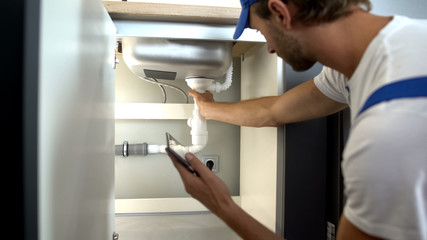A Plumber is a person who installs a system for potable water, sewage, or drainage. This type of contractor is often referred to as a master plumber. Plumbers are highly trained in all of these areas. If you need a plumber for any reason, here are some tips for hiring a good one. Also, be sure to ask for references. Plumbers also work on a contract basis. Here are some common tasks that plumbers perform.

One of the most popular tasks that plumbers perform is water supply. Water taps, pipes, and other plumbing systems are necessary for water supply. Those who work on the water supply systems are required to secure stormwater and prevent contamination. Drainage works include laying drains and securing sewage systems. This requires excellent communication skills. The job of a plumber is often demanding, so plumbing graduates need to be adaptable and take on extra responsibility.
Plumbing jobs vary in size. They can be large, such as installing water lines in buildings, or small, like repairing a leaking refrigerator. Plumbers also install fixtures like water heaters, dishwashers, and toilets. They also unclog pipes and maintain septic systems. These jobs require a strong knowledge of math, physics, and chemistry. In addition to plumbing, plumbers also troubleshoot problems, read blueprints, and work well with others.
A plumber must possess a Certificate IV in Plumbing and an interim gas license. A plumber should be aware of the risks of infections when working with human waste. Vomit, faecal matter, and sewage pipes contain microbes that can cause infections. Plumbers should take precautions to protect themselves from these harmful microbes. If they do not follow the rules, their job could be dangerous. That’s why plumbing education is vital.
The job of a plumber varies depending on the specialty. Those who specialize in drain cleaning, sewage, and drainage systems are considered to be plumbers. They can work in homes or commercial establishments. Plumbing jobs are very varied, with a wide range of specialties. Some of the highest paying ones, however, are in niche specialties with less competition. In addition, plumbers can be in charge of the installation process for large equipment like heating systems or cooling systems.
Plumbing apprentices generally assist a more experienced plumber. They learn on-the-job training and regulations, as well as specialised skills. A plumber may specialise in one or more areas of plumbing, including appliances, fixtures, and building systems. If he or she has the right skills and training, he or she may go on to become a master plumber. And as a bonus, many master plumbers specialize in a particular area of plumbing.
People interested in plumbing may find themselves surrounded by messy situations. The physical demands of this profession are high, so many apprentices quit after a few months. Despite this, plumbers are generally independent and self-motivated. In addition to plumbing, many plumbers are also honest, hard-working, and thrifty. Plumbers may work for construction sites or architectural firms. They may work on the construction site themselves. However, the job is not for everyone, and there are many advantages and disadvantages of this profession.
Commercial plumbers typically work in large commercial settings. They are responsible for installing pipes, sewer systems, and toilets in buildings. Their work involves trenching, installing drains, and installing pipelines. This type of plumbing involves more risk than residential plumbing. If you choose to be a residential plumber, it is important to know the skills and qualifications necessary to be successful in this type of work. For example, if you work in an office building, you should hire a commercial plumber.
A plumber’s salary depends on the type of job and experience. Most plumbers earn a decent wage, but their salary depends on their experience. They earn a median wage that is higher than the average for other construction trade workers. In addition, plumbers who belong to unions tend to make higher wages than other members. They also need to be available for emergency jobs and can be expected to work overtime. However, they are not paid very well if they don’t have a union.
Plumbing can be an extremely rewarding career. Many licensed plumbers stay in this field for the rest of their careers. Several even choose to stay in the industry part-time after retirement age. Some even offer apprenticeships or learning opportunities to help their students advance in the field. There are even accredited plumbing schools online. In addition, Penn Foster is a reputable online school. This accredited school can prepare you for a career in the field of plumbing.